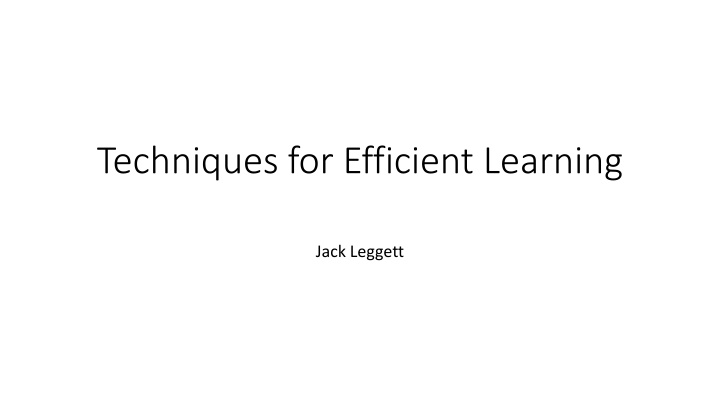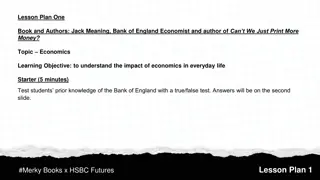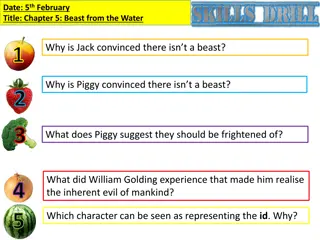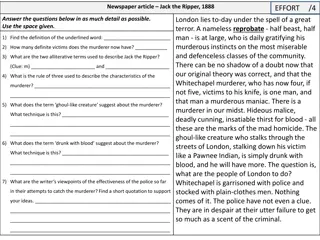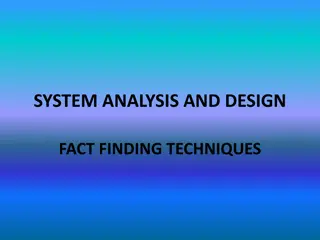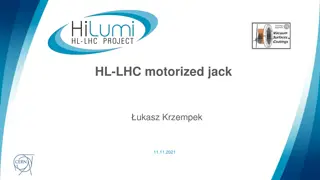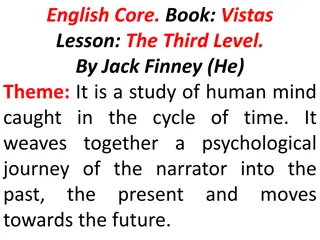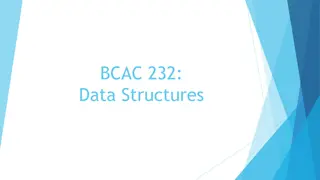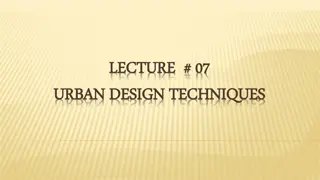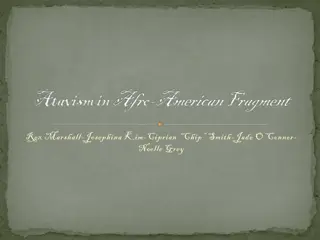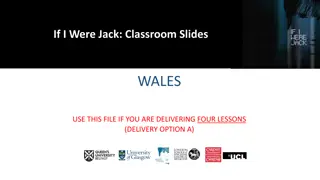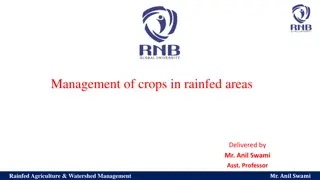Techniques for Efficient Learning by Jack Leggett
Learning interventions should be concrete, cost-effective, and supported by high-quality evidence. Recruit participants by random assignment to experimental, alternative, or no special treatment groups to measure and compare long-term outcomes of interest. Understanding the forgetting curve and realizing that people learn best by overcoming difficult challenges with clear feedback are key principles in efficient learning.
Uploaded on Nov 16, 2024 | 2 Views
Download Presentation

Please find below an Image/Link to download the presentation.
The content on the website is provided AS IS for your information and personal use only. It may not be sold, licensed, or shared on other websites without obtaining consent from the author.If you encounter any issues during the download, it is possible that the publisher has removed the file from their server.
You are allowed to download the files provided on this website for personal or commercial use, subject to the condition that they are used lawfully. All files are the property of their respective owners.
The content on the website is provided AS IS for your information and personal use only. It may not be sold, licensed, or shared on other websites without obtaining consent from the author.
E N D
Presentation Transcript
Techniques for Efficient Learning Jack Leggett
Catch - Free Film - Sheet Press - Clothes Heavy - Music Judge - Bench
Learning interventions should be Concrete Cost-effective Supported by high-quality evidence
Recruit participants Randomly assign to... Experimental Treatment Alternative Treatment No Special Treatment Measure and compare outcomes of interest in the long-term
Catch - Free Film - Sheet Press - Clothes Heavy - Music Judge - Bench
100 Forgetting curve (Ebbinghaus, 1913) 90 80 70 Percentage retained 60 50 40 30 20 10 0 9 hours 31 days 1 day 20 mins 60 mins 0 mins 2 days 6 days Time since learning
People do not reliably learn information from mere exposure But they do reliably learn information needed for tasks they perform Strong learning results not from mere exposure, but from overcoming increasingly difficult, realistic challenges and receiving clear feedback
People do not reliably learn information from mere exposure But they do reliably learn information needed for tasks they perform Strong learning results not from mere exposure, but from overcoming increasingly difficult, realistic challenges and receiving clear feedback
Retrieval Practice A learning task for developing knowledge and understanding
Roediger & Karpicke (2006) Participants read passage of text Then reread or take practice test Then freely recall facts from passage
Roediger & Karpicke (2006) 1 Study, Study 0.9 Study, Test Proportion Correct 0.8 0.7 0.6 0.5 0.4 0.3 0.2 0.1 0 5 Minutes 2 Days 1 Week Retention Interval
Free Recall Recall all word-pairs in any order
Cued Recall Recall the other word in the pair Heavy - ?
Recognition Which of these pairs was in the list? Judge Pressure Film Free - - - - Bar Crush Sheet Cost
Adjusting challenge Form of retrieval task Free recall (create from memory an essay, paragraph, concept map, etc.) Cued recall (short answer question) Recognition (multiple choice question) Hints and follow-up questions ( scaffolding )
Adjusting challenge Hints Heavy - M _ _ _ c Hint: Something you can listen to.
Adjusting challenge Form of retrieval task Free recall (create from memory an essay, paragraph, concept map, etc.) Cued recall (short answer question) Recognition (multiple choice question) Hints and follow-up questions ( scaffolding )
Adjusting challenge Form of retrieval task Free recall (create from memory an essay, paragraph, concept map, etc.) Cued recall (short answer question) Recognition (multiple choice question) Hints and follow-up questions ( scaffolding ) Spacing Time between repetitions of any learning task
Adjusting challenge Spacing Learning material divided into five sets On day 1: Studied set A four times and set E once On day 2: Studied set B four times and set E once On day 3: Studied set C four times and set E once On day 4: Studied set D four times and set E once On day 5: Took test on all material How would performance differ between the sets? Kornell (2009)
Adjusting challenge Spacing 100 Percentage Recalled on Day 5 90 Spaced Massed 80 (once each day) (4 times on one day) 70 60 50 40 30 Spacing is a helpful challenge in learning 20 10 0 E A 1 B 2 C 3 D 4 All 4 Material Set Study day Kornell (2009)
Interleaving, a friend of spacing Blocked Randomly interleaved A A A B B B A B A B B A B A B A B A
Interleaving, a friend of spacing Interleaving imposes spacing, encourages retrieval, and improves learning of categories To increase challenge, change from a blocked schedule to an interleaved schedule
Adjusting challenge Form of retrieval task Free recall (create from memory an essay, paragraph, concept map, etc.) Cued recall (short answer question) Recognition (multiple choice question) Hints and follow-up questions ( scaffolding ) Spacing Time between repetitions of any learning task Interleaving different learning tasks is a good way to space repetitions Scaffolding, spacing, and interleaving work for any learning task Adjust these so that learners experience challenge, but mostly succeed
Adjusting challenge Form of retrieval task Free recall (create from memory an essay, paragraph, concept map, etc.) Cued recall (short answer question) Recognition (multiple choice question) Hints and follow-up questions ( scaffolding ) Spacing Time between repetitions of any learning task Interleaving different learning tasks is a good way to space repetitions Scaffolding, spacing, and interleaving work for any learning task Adjust these so that learners experience challenge, but mostly succeed
Kornell et al. (2009) Participants learn some word-pairs by reading and some by guessing with feedback 24 hours later, given cued-recall test on all pairs
Read Trial 13 seconds to read Press Clothes
Guess Trial 8 seconds to guess Catch ?
Guess Trial 8 seconds to guess Catch ? Ball
Guess Trial 5 seconds to view feedback Catch Free
Test Trial Recall word shown by computer Catch ?
Kornell et al. (2009) Results of delayed cued-recall test 100 90 Errors are an inevitable result of challenge, but usually improve learning if feedback is clear 80 Percentage recalled 70 60 50 40 30 20 10 0 Read Guess with feedback Learning activity
Challenging feedback Scaffolding Scaffolded feedback encourages learners to self-correct, and improves long-term retention Finn & Metcalfe (2010)
Challenging feedback Explanations Explanatory feedback improves transfer of learning to new situations (i.e., understanding) Butler et al. (2012)
Summary Whenever teaching, consider how to use a task rather than mere exposure Retrieval a good task for developing knowledge Use hints and spacing to encourage success with challenge, not fluency Give scaffolding and explanatory feedback Embrace errors as signs of challenge and chances for learning
Contact: jack.leggett@uqconnect.edu.au Further reading: Bjork et al. (2013). Self-regulated learning: Beliefs, techniques, and illusions. Annual Review of Psychology, 64, 417-444. Dunlosky, J., Rawson, K. A., Marsh, E. J., Nathan, M. J., & Willingham, D. T. (2013). Improving students learning with effective learning techniques: Promising directions from cognitive and educational psychology. Psychological Science in the Public Interest, 14(1), 4-58. Pashler, H., Bain, P., Bottge, B., Graesser, A., Koedinger, K., McDaniel, M., and Metcalfe, J. (2007) Organizing Instruction and Study to Improve Student Learning (NCER 2007-2004). Washington, DC: National Center for Education Research, Institute of Education Sciences, U.S. Department of Education. Retrieved from https://ies.ed.gov/ncee/wwc/PracticeGuide/1
